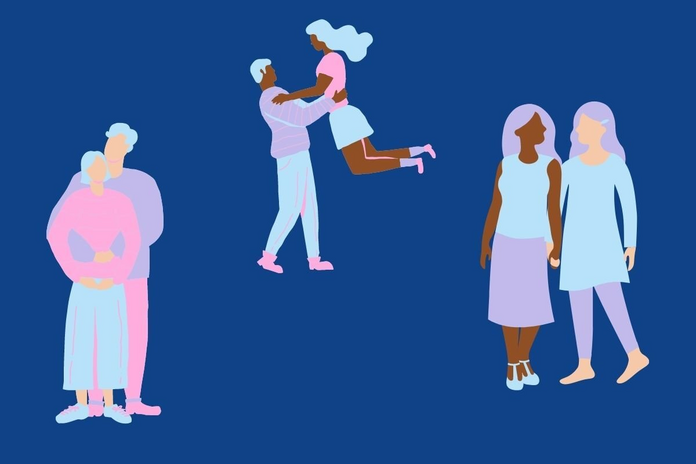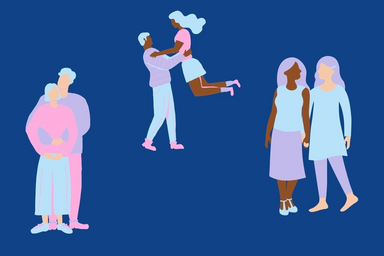You’ve seen the same old storyline in any pop culture movie that involves college students or a college campus: a huge party is thrown, attractive people from all social spheres are drinking and having a good time, and by the end of the night everyone is making out and finding a bedroom or bathroom or closet to act out their own rendition of seven minutes in heaven. But is this Hollywood-favorite narrative accurate or just another extreme interpretation of the “college experience?” There are a lot of common misconceptions about sexual relationships in college, whether it be at WVU or elsewhere.
When looking at the common misconceptions about sex surrounding college-aged people, it’s important to address a major part of college life that is often tied to sexual occurrences: party culture. As someone who came from a small town in southern West Virginia, where the only parties are thrown in random fields or someone’s house when their parents are gone for the weekend, experiencing the Morgantown nightlife was much more than I bargained for. Obviously, I knew the party reputation of WVU. Both of my parents are alumni and attended WVU in its 1980’s heyday of burning down half of Sunnyside, but listening to their stories never prepared me for the party and sex culture that actually comes with a college town. The party culture creates so many scenarios for sexual interactions to happen— consensual or not. While some people may just go to parties looking for a hookup, parties can produce an atmosphere where alcohol gives people the liquid courage they need to be bolder in their advances and others the courage to accept those advances where anxiety and self-doubt may have otherwise prevented that interaction from occurring.
By the time someone is in college, they usually understand what sex is and that, while they themselves may not participate, other people are. Sex can be a touchy subject with some people, but that’s not the case for many who go to WVU. As shown by LoveHoney’s ranking, Morgantown as the #1 2019 Sexiest City in America. According to LoveHoney, a sex toy manufacturer, Morgantown residents had the greatest amount of sex toys purchased out of the other 250 cities surveyed. Of course, this survey doesn’t document the true number of sexual encounters within the area, but it does create some kind of notion of what happens in a college town.
While WVU students may set the curve on sexual experiences and encounters for LoveHoney’s survey, according to other studies, there’s actually an opposite trend happening in college-aged people: we are having less sex now than we did 20 years ago. A 2018 study performed by the National College Health Assessment showed a decline in sexual activity in college students from 2000, with 66 percent of college-aged students having sex in the last 12 months in 2018, compared to 72 percent in 2000. But why is this sexual recession happening, and why is there still a misconception about sex in college-aged people?
Mainstream media outlets and scientists alike have picked up on this sexual decline in the world of young adults and explored several theories as to why this phenomenon is present. The Atlantic interviewed Helen Fischer, an anthropologist who studies love and sex, who said, “The data is that people are having less sex.” Like many other researchers, Fischer attributes this to a decline in couplehood, or people entering into romantic relationships. This decline in couplehood and thus decline in sex could be the result of the changes in marriage rate and age; the marriage rate has been decreasing while the age at marriage has been increasing for the last several decades. Career choice, economic pressures and family dynamics may impact why people decide when to marry, but by the same token, they could also reduce the amount of sexual interactions occurring too. The transition into the 21st century marked a major change in social expectations like marriage and education, meaning that more people are getting college degrees and prioritizing this education over their personal or intimate relationships. Shifting the priorities from relationships to education could be a major contributing factor to the decline in the libido of college students.
So, if there’s truly a decline in the amount of sex us students are having, why are there still so many misconceptions about sex in college and possible pressure on young adults to have sex? The answer could possibly be that we as a population are exhibiting pluralistic ignorance. Pluralistic ignorance refers to “erroneous beliefs held by a group of individuals about the attitudes or behaviors of others.” This term could possibly answer the question presented above because it explains how these misconceptions and sexual pressures develop.
In one study, Singapore college students were surveyed and found to have widespread pluralistic ignorance about sex, with students believing their peers were having more sex than they actually were. This data is consistent with sexual recession found from the National College Health Assessment’s 2018 survey, but what possibly could form these beliefs? This Singapore-based study revealed two possible culprits: the media’s portrayal of sex in young people, as well as their own feelings about sex. Deriving faulty notions from the media makes sense. In fact, it is a regular occurrence. The media shapes people’s preconceived ideas and produces misconceptions about relationships, our bodies, love and sex. For college-aged people and students, continually consuming media that says you’re supposed to be having sex at all— let alone with more than one person— makes it easy to start to project that idea on your peers. Additionally, one’s own sexual attitudes and desires can be projected on their peers; feelings of inadequacy and loneliness coupled with little to no sexual experience can manifest itself into pluralistic ignorance about the sex lives of others.
Now that we have some possible culprits behind the over-sexualization of the lives of college students, what can we do to break down those misconceptions? For one, it is important to address your own feelings and desires instead of assuming everyone else feels the same. There will be plenty of people who feel the same or differently about the issue of sex, but ultimately you have to decide how you are going to respond to it. Although you may be actively participating in sex or desire to, you shouldn’t project that onto others who may possibly avoid this behavior, no matter the reason. Sex is not a one-size-fits-all topic; everyone has different expectations, anatomies, preferences and fears, so finding what is right for you may take time and that’s okay. Sex can be scary, but it should be enjoyable, involve consent and boundaries, and it can be meaningful. But sex can be just sex, and ultimately it is up to you when you should experience it. While the interactions of college students may be oversexualized by the media and other individuals, you don’t have to uphold that false narrative.



